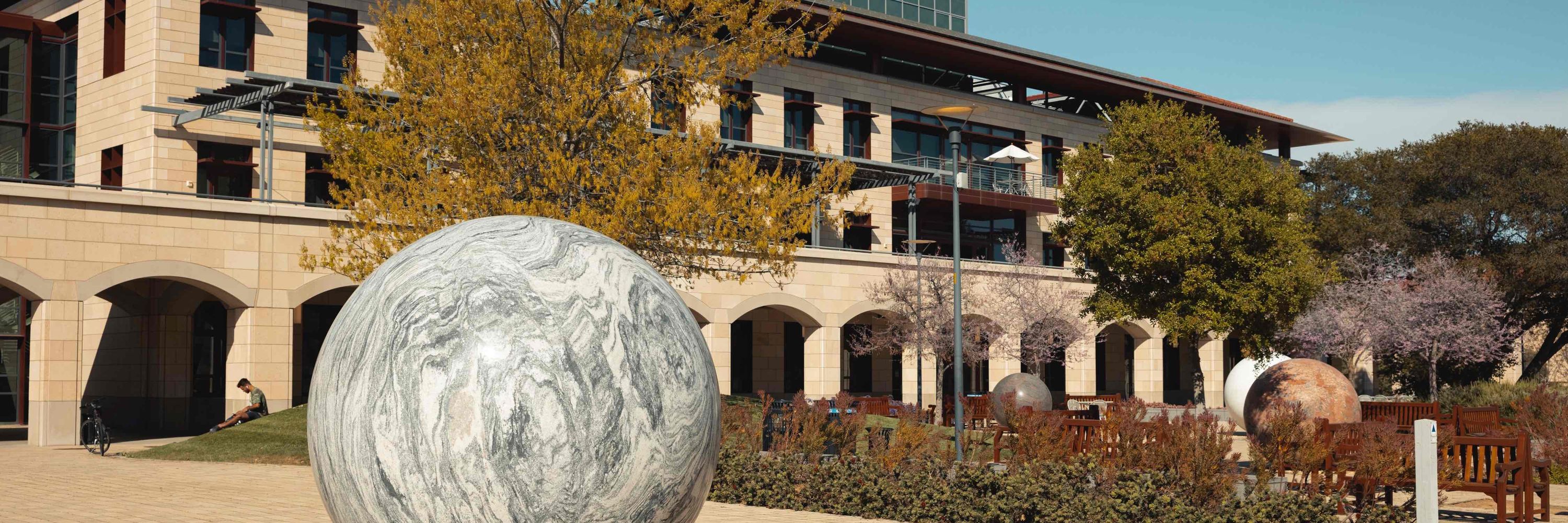
Stanford Woods Institute for the Environment
@woods.stanford.edu
Stanford's collaboration hub for interdisciplinary environmental research about people & planet. Focused on climate resilience, natural climate solutions, thriving ecosystems, human & planetary health and just outcomes. | woods.stanford.edu
How can low-carbon concrete floors be a health and climate solution?
Watch the full #UncommonCollaborators episode 🎥 youtu.be/rQUVt3jMN_c
Read more: stanford.io/4gaergd
#climatesolutions #research #publichealth
Watch the full #UncommonCollaborators episode 🎥 youtu.be/rQUVt3jMN_c
Read more: stanford.io/4gaergd
#climatesolutions #research #publichealth
November 3, 2025 at 11:35 PM
How can low-carbon concrete floors be a health and climate solution?
Watch the full #UncommonCollaborators episode 🎥 youtu.be/rQUVt3jMN_c
Read more: stanford.io/4gaergd
#climatesolutions #research #publichealth
Watch the full #UncommonCollaborators episode 🎥 youtu.be/rQUVt3jMN_c
Read more: stanford.io/4gaergd
#climatesolutions #research #publichealth
From ammonia to Alcatraz, Stanford students are pursuing fascinating research questions. They’re gaining hands-on experience, sharpening their scientific skills, and exploring solutions to real-world challenges.
Discover student program opportunities: bit.ly/48tPCaB
Discover student program opportunities: bit.ly/48tPCaB

October 22, 2025 at 8:10 PM
From ammonia to Alcatraz, Stanford students are pursuing fascinating research questions. They’re gaining hands-on experience, sharpening their scientific skills, and exploring solutions to real-world challenges.
Discover student program opportunities: bit.ly/48tPCaB
Discover student program opportunities: bit.ly/48tPCaB
This week, students, faculty, and staff came together to celebrate human and planetary health at Stanford — and to connect on new opportunities ahead. (Also pictured: tiny succulent party favors 🪴)
🌍 Stay in the loop by subscribing to the HPH newsletter: bit.ly/4nicFfy
🌍 Stay in the loop by subscribing to the HPH newsletter: bit.ly/4nicFfy



October 16, 2025 at 7:57 PM
This week, students, faculty, and staff came together to celebrate human and planetary health at Stanford — and to connect on new opportunities ahead. (Also pictured: tiny succulent party favors 🪴)
🌍 Stay in the loop by subscribing to the HPH newsletter: bit.ly/4nicFfy
🌍 Stay in the loop by subscribing to the HPH newsletter: bit.ly/4nicFfy
Meet our inaugural Visiting Policy Fellows!
Alice C. Hill is a senior fellow at @cfr.org and former White House adviser. Michael Jordan, former USAID advisor, is managing director at Banneker Capital.
As fellows, they’ll collaborate with Stanford experts to advance climate policy solutions.
Alice C. Hill is a senior fellow at @cfr.org and former White House adviser. Michael Jordan, former USAID advisor, is managing director at Banneker Capital.
As fellows, they’ll collaborate with Stanford experts to advance climate policy solutions.


October 14, 2025 at 8:35 PM
Meet our inaugural Visiting Policy Fellows!
Alice C. Hill is a senior fellow at @cfr.org and former White House adviser. Michael Jordan, former USAID advisor, is managing director at Banneker Capital.
As fellows, they’ll collaborate with Stanford experts to advance climate policy solutions.
Alice C. Hill is a senior fellow at @cfr.org and former White House adviser. Michael Jordan, former USAID advisor, is managing director at Banneker Capital.
As fellows, they’ll collaborate with Stanford experts to advance climate policy solutions.
Woods is hiring! From public health to energy policy, shape practical solutions to the world’s toughest challenges.
➡️ Check out the current openings here: stanford.io/4gI7OCs
➡️ Check out the current openings here: stanford.io/4gI7OCs

September 29, 2025 at 5:27 PM
Woods is hiring! From public health to energy policy, shape practical solutions to the world’s toughest challenges.
➡️ Check out the current openings here: stanford.io/4gI7OCs
➡️ Check out the current openings here: stanford.io/4gI7OCs
Wildfire smoke emissions caused an estimated 41,380 excess deaths per year during 2011 to 2020. Rising temperatures could increase those deaths by more than 70% by 2050, according to a new study.
🔗 bit.ly/46D0AeA
@stanforddoerr.bsky.social #climate #wildfires
🔗 bit.ly/46D0AeA
@stanforddoerr.bsky.social #climate #wildfires


September 24, 2025 at 5:28 PM
Wildfire smoke emissions caused an estimated 41,380 excess deaths per year during 2011 to 2020. Rising temperatures could increase those deaths by more than 70% by 2050, according to a new study.
🔗 bit.ly/46D0AeA
@stanforddoerr.bsky.social #climate #wildfires
🔗 bit.ly/46D0AeA
@stanforddoerr.bsky.social #climate #wildfires
Warmer weather is reshaping the landscape of human health.
Cases of dengue could rise as much as 76% across a large swath of Asia and the Americas by 2050, according to a new study.
Read our story: bit.ly/3HRR6DV
Explore the research: bit.ly/3Vc5UjM
Cases of dengue could rise as much as 76% across a large swath of Asia and the Americas by 2050, according to a new study.
Read our story: bit.ly/3HRR6DV
Explore the research: bit.ly/3Vc5UjM

September 10, 2025 at 6:20 PM
Warmer weather is reshaping the landscape of human health.
Cases of dengue could rise as much as 76% across a large swath of Asia and the Americas by 2050, according to a new study.
Read our story: bit.ly/3HRR6DV
Explore the research: bit.ly/3Vc5UjM
Cases of dengue could rise as much as 76% across a large swath of Asia and the Americas by 2050, according to a new study.
Read our story: bit.ly/3HRR6DV
Explore the research: bit.ly/3Vc5UjM
A species of disease-carrying mosquitoes is gaining a foothold in Southern California, thanks to rising temperatures and mild winters.
Watch Woods fellow Erin Mordecai discuss her team's research in Costa Rica, tracking mosquito migration to better predict future disease risk.
🎬: bit.ly/47U4L7L
Watch Woods fellow Erin Mordecai discuss her team's research in Costa Rica, tracking mosquito migration to better predict future disease risk.
🎬: bit.ly/47U4L7L

August 29, 2025 at 7:05 PM
A species of disease-carrying mosquitoes is gaining a foothold in Southern California, thanks to rising temperatures and mild winters.
Watch Woods fellow Erin Mordecai discuss her team's research in Costa Rica, tracking mosquito migration to better predict future disease risk.
🎬: bit.ly/47U4L7L
Watch Woods fellow Erin Mordecai discuss her team's research in Costa Rica, tracking mosquito migration to better predict future disease risk.
🎬: bit.ly/47U4L7L
Human urine is often seen as waste. But globally, it contains enough nitrogen to meet 14% of annual fertilizer demand.
A new Stanford-designed system uses solar power to extract fertilizer directly from urine.
Read our story here: bit.ly/45T6B6y
A new Stanford-designed system uses solar power to extract fertilizer directly from urine.
Read our story here: bit.ly/45T6B6y
August 21, 2025 at 7:34 PM
Human urine is often seen as waste. But globally, it contains enough nitrogen to meet 14% of annual fertilizer demand.
A new Stanford-designed system uses solar power to extract fertilizer directly from urine.
Read our story here: bit.ly/45T6B6y
A new Stanford-designed system uses solar power to extract fertilizer directly from urine.
Read our story here: bit.ly/45T6B6y
It's research grant award season! Each year, the Stanford Woods Institute for the Environment awards funding to bold, interdisciplinary projects tackling our planet’s most urgent challenges.
🏆 Meet the 2025 awardees here: bit.ly/3UCIhR8
🏆 Meet the 2025 awardees here: bit.ly/3UCIhR8
August 21, 2025 at 4:01 PM
It's research grant award season! Each year, the Stanford Woods Institute for the Environment awards funding to bold, interdisciplinary projects tackling our planet’s most urgent challenges.
🏆 Meet the 2025 awardees here: bit.ly/3UCIhR8
🏆 Meet the 2025 awardees here: bit.ly/3UCIhR8
🔥 Prescribed fire can protect lives, property, and ecosystems – but how can we expand its use on private lands?
In our upcoming webinar, Stanford researchers and wildfire experts will examine state policies and barriers to action.
🔗 Register here: bit.ly/45owBpO
#wildfire #prescribedfire
In our upcoming webinar, Stanford researchers and wildfire experts will examine state policies and barriers to action.
🔗 Register here: bit.ly/45owBpO
#wildfire #prescribedfire

August 13, 2025 at 9:21 PM
🔥 Prescribed fire can protect lives, property, and ecosystems – but how can we expand its use on private lands?
In our upcoming webinar, Stanford researchers and wildfire experts will examine state policies and barriers to action.
🔗 Register here: bit.ly/45owBpO
#wildfire #prescribedfire
In our upcoming webinar, Stanford researchers and wildfire experts will examine state policies and barriers to action.
🔗 Register here: bit.ly/45owBpO
#wildfire #prescribedfire
New points for policymakers from Woods scholars lay out:
🌽 What we've learned from 50 years of #ClimateChange effects on crops: stanford.io/3HmXfaH
+
🌍 What farmer adaptations could mean for global #FoodSecurity: bit.ly/4mbrf8O
🌽 What we've learned from 50 years of #ClimateChange effects on crops: stanford.io/3HmXfaH
+
🌍 What farmer adaptations could mean for global #FoodSecurity: bit.ly/4mbrf8O
August 12, 2025 at 8:43 PM
New points for policymakers from Woods scholars lay out:
🌽 What we've learned from 50 years of #ClimateChange effects on crops: stanford.io/3HmXfaH
+
🌍 What farmer adaptations could mean for global #FoodSecurity: bit.ly/4mbrf8O
🌽 What we've learned from 50 years of #ClimateChange effects on crops: stanford.io/3HmXfaH
+
🌍 What farmer adaptations could mean for global #FoodSecurity: bit.ly/4mbrf8O
🦫 Bringing back #beavers – and the nature-based solutions they offer for #freshwater, #biodiversity, and #ClimateResilience
New study uses #RemoteSensing to map beaver dams + ponds with an eye toward prioritizing areas for restoration and reintroducing beavers.
🔗 bit.ly/bringing-back-beavers
New study uses #RemoteSensing to map beaver dams + ponds with an eye toward prioritizing areas for restoration and reintroducing beavers.
🔗 bit.ly/bringing-back-beavers

August 11, 2025 at 8:13 PM
🦫 Bringing back #beavers – and the nature-based solutions they offer for #freshwater, #biodiversity, and #ClimateResilience
New study uses #RemoteSensing to map beaver dams + ponds with an eye toward prioritizing areas for restoration and reintroducing beavers.
🔗 bit.ly/bringing-back-beavers
New study uses #RemoteSensing to map beaver dams + ponds with an eye toward prioritizing areas for restoration and reintroducing beavers.
🔗 bit.ly/bringing-back-beavers
A new report finds that sustainable retrofitting can boost occupant quality of life alongside environmental benefits.
"Our goal is to put resident wellbeing at the center of sustainable home upgrades, from start to finish." – Sarah Billington, Woods senior fellow.
🔗 bit.ly/4liqauo
"Our goal is to put resident wellbeing at the center of sustainable home upgrades, from start to finish." – Sarah Billington, Woods senior fellow.
🔗 bit.ly/4liqauo

August 8, 2025 at 8:30 PM
A new report finds that sustainable retrofitting can boost occupant quality of life alongside environmental benefits.
"Our goal is to put resident wellbeing at the center of sustainable home upgrades, from start to finish." – Sarah Billington, Woods senior fellow.
🔗 bit.ly/4liqauo
"Our goal is to put resident wellbeing at the center of sustainable home upgrades, from start to finish." – Sarah Billington, Woods senior fellow.
🔗 bit.ly/4liqauo
💡New points for policymakers highlight the benefits of prescribed fire compared to mechanical thinning and potential applications to wildfire policy 🔥
Download the research brief with insights from Stanford scholars Makoto Kelp, Noah Diffenbaugh, and Marshall Burke: stanford.io/4mnek3h
Download the research brief with insights from Stanford scholars Makoto Kelp, Noah Diffenbaugh, and Marshall Burke: stanford.io/4mnek3h
August 5, 2025 at 11:54 PM
💡New points for policymakers highlight the benefits of prescribed fire compared to mechanical thinning and potential applications to wildfire policy 🔥
Download the research brief with insights from Stanford scholars Makoto Kelp, Noah Diffenbaugh, and Marshall Burke: stanford.io/4mnek3h
Download the research brief with insights from Stanford scholars Makoto Kelp, Noah Diffenbaugh, and Marshall Burke: stanford.io/4mnek3h
Across the country, electricity bills are rising. Senior research scholar Michael Wara stopped by KQED to break down all the factors driving the increase, from tree trimming to wildfire prevention measures.
Listen here: bit.ly/45m4aZE
#energycosts #wildfires
Listen here: bit.ly/45m4aZE
#energycosts #wildfires
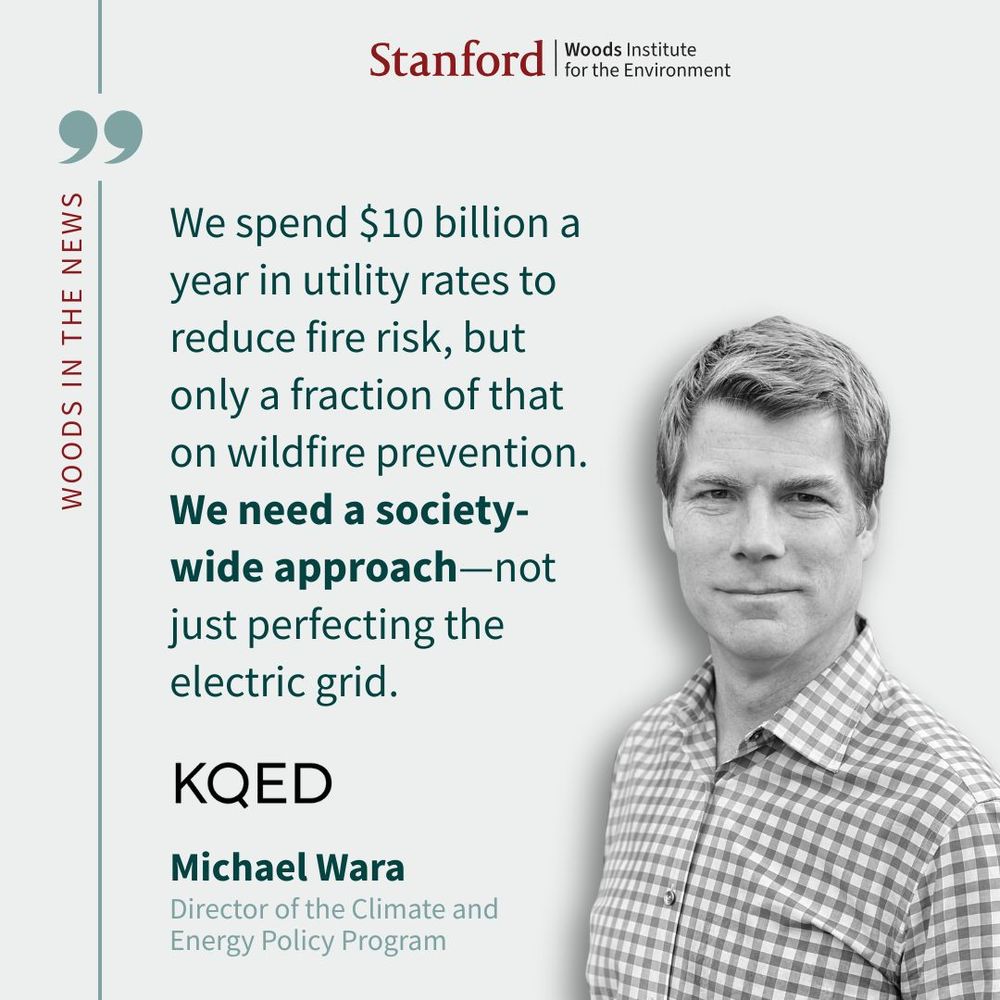
August 5, 2025 at 5:13 PM
Across the country, electricity bills are rising. Senior research scholar Michael Wara stopped by KQED to break down all the factors driving the increase, from tree trimming to wildfire prevention measures.
Listen here: bit.ly/45m4aZE
#energycosts #wildfires
Listen here: bit.ly/45m4aZE
#energycosts #wildfires
In an era of global change, ocean scientist Fiorenza Micheli and literary scholar Margaret Cohen are coming together to explore people's impact on and connection to the ocean through the "blue" humanities 🌊
Watch the latest #UncommonCollaborators episode 🎥 bit.ly/4mitoPL
Watch the latest #UncommonCollaborators episode 🎥 bit.ly/4mitoPL
July 24, 2025 at 11:32 PM
In an era of global change, ocean scientist Fiorenza Micheli and literary scholar Margaret Cohen are coming together to explore people's impact on and connection to the ocean through the "blue" humanities 🌊
Watch the latest #UncommonCollaborators episode 🎥 bit.ly/4mitoPL
Watch the latest #UncommonCollaborators episode 🎥 bit.ly/4mitoPL
We’re thrilled to announce the 2025 LInC cohort! Relaunched after a pandemic pause, LInC equips early- and mid-career faculty to tackle complex global challenges through interdisciplinary research across law, medicine, engineering, humanities, and sustainability.
Learn more: stanford.io/4lAxK4Q
Learn more: stanford.io/4lAxK4Q
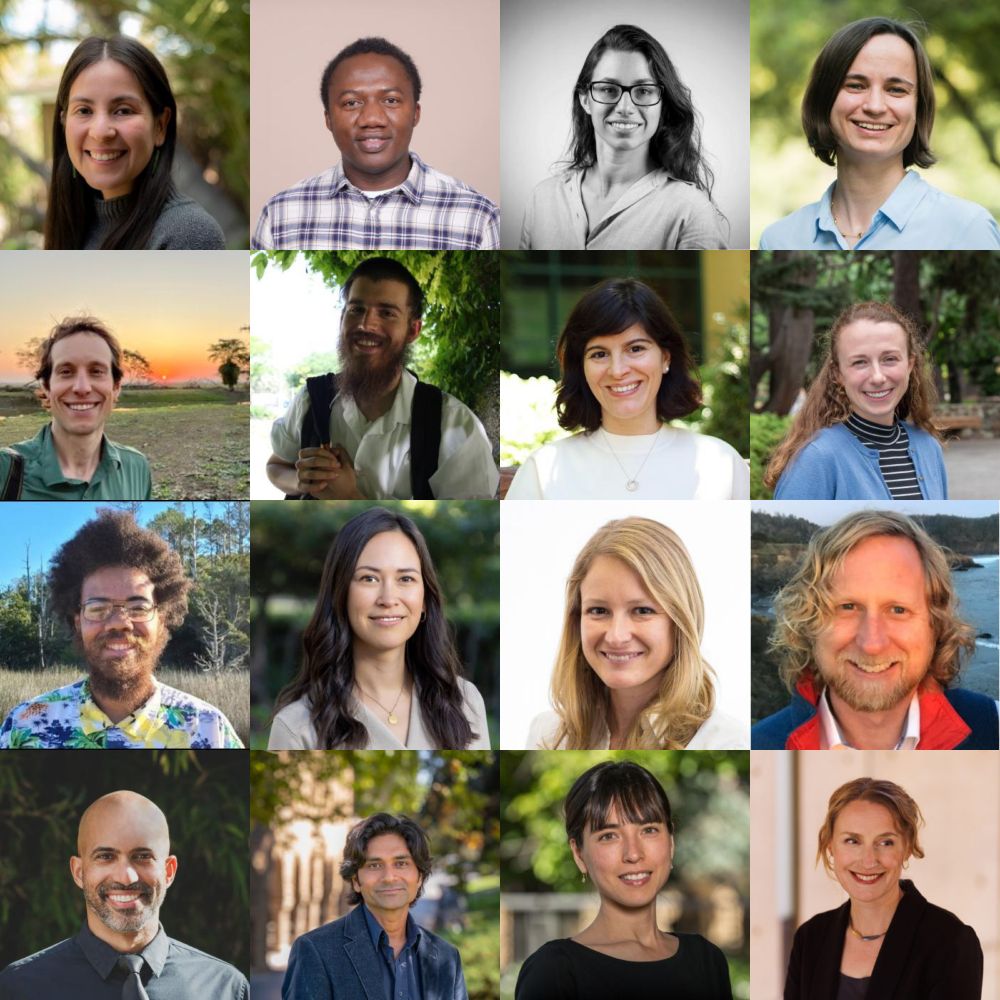
July 14, 2025 at 6:15 PM
We’re thrilled to announce the 2025 LInC cohort! Relaunched after a pandemic pause, LInC equips early- and mid-career faculty to tackle complex global challenges through interdisciplinary research across law, medicine, engineering, humanities, and sustainability.
Learn more: stanford.io/4lAxK4Q
Learn more: stanford.io/4lAxK4Q
Could an invasive species be a public health secret weapon?
Funded in partnership with stanfordcigh.bsky.social, this Global Health Seed Grant Award supports researchers as they analyze the impact on invasive marbled crayfish on disease-spreading snails.
�� https://bit.ly/4eE3T3TFW
Funded in partnership with stanfordcigh.bsky.social, this Global Health Seed Grant Award supports researchers as they analyze the impact on invasive marbled crayfish on disease-spreading snails.
�� https://bit.ly/4eE3T3TFW
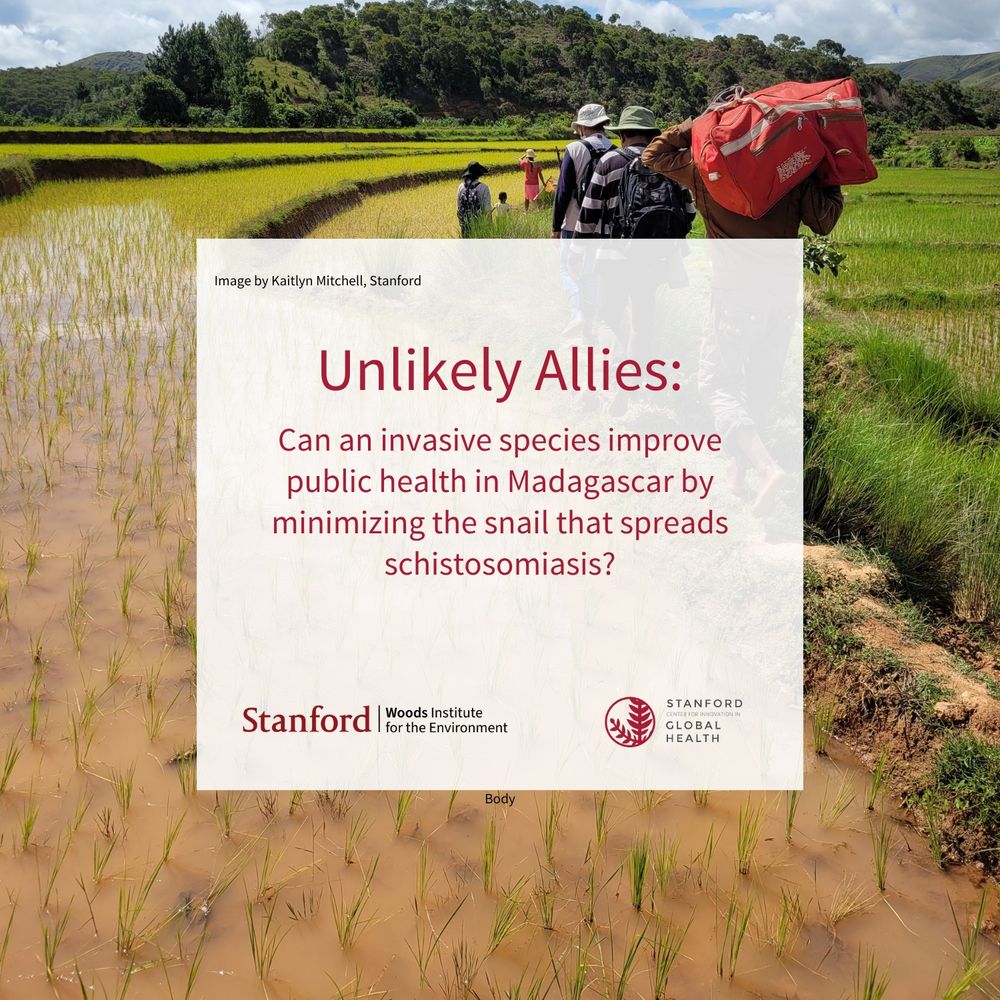
July 1, 2025 at 7:02 PM
Could an invasive species be a public health secret weapon?
Funded in partnership with stanfordcigh.bsky.social, this Global Health Seed Grant Award supports researchers as they analyze the impact on invasive marbled crayfish on disease-spreading snails.
�� https://bit.ly/4eE3T3TFW
Funded in partnership with stanfordcigh.bsky.social, this Global Health Seed Grant Award supports researchers as they analyze the impact on invasive marbled crayfish on disease-spreading snails.
�� https://bit.ly/4eE3T3TFW
💌 The latest edition of People&Planet, our monthly newsletter, is out now!
We check in on the state of cultivated meat, look into planting trees as a public health strategy, and share events and job opportunities.
Subscribe: bit.ly/3GcHSRM
Read June's edition: bit.ly/44jxD64
We check in on the state of cultivated meat, look into planting trees as a public health strategy, and share events and job opportunities.
Subscribe: bit.ly/3GcHSRM
Read June's edition: bit.ly/44jxD64
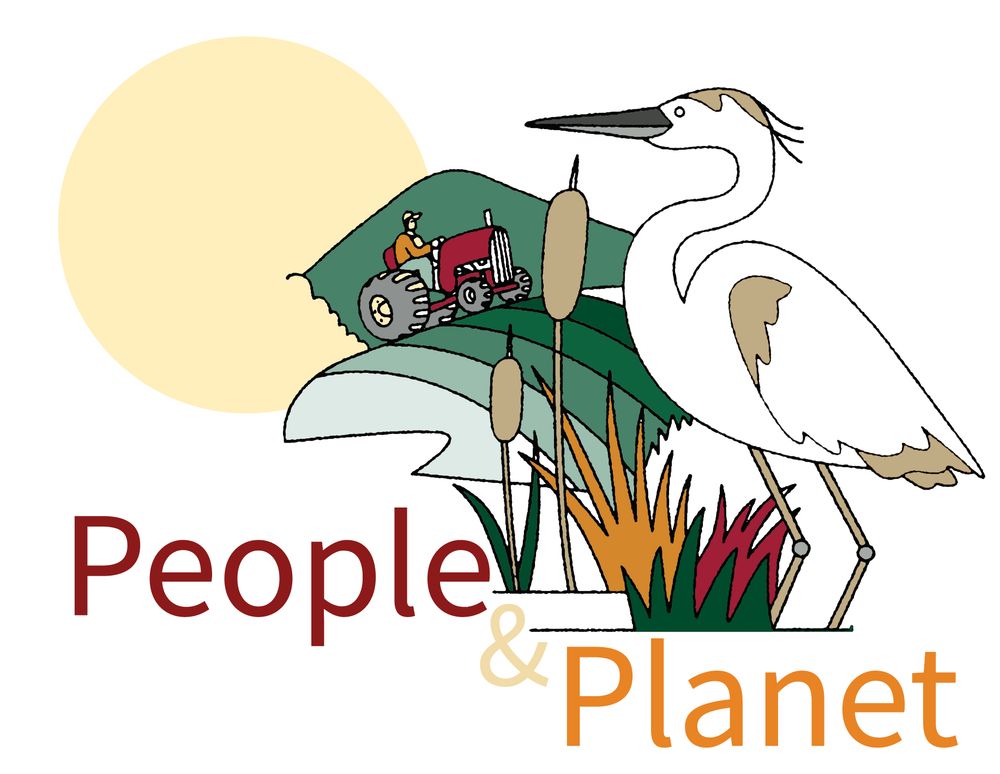
June 27, 2025 at 9:04 PM
💌 The latest edition of People&Planet, our monthly newsletter, is out now!
We check in on the state of cultivated meat, look into planting trees as a public health strategy, and share events and job opportunities.
Subscribe: bit.ly/3GcHSRM
Read June's edition: bit.ly/44jxD64
We check in on the state of cultivated meat, look into planting trees as a public health strategy, and share events and job opportunities.
Subscribe: bit.ly/3GcHSRM
Read June's edition: bit.ly/44jxD64
Vultures might not be as beloved as bunnies, but they're key to human health. By eating carrion and culling the populations of smaller scavengers, they help limit the spread of zoonotic diseases.
A new Stanford study found that 36% of the world's scavenger species are in decline.
🔗 bit.ly/4kXmhfi
A new Stanford study found that 36% of the world's scavenger species are in decline.
🔗 bit.ly/4kXmhfi
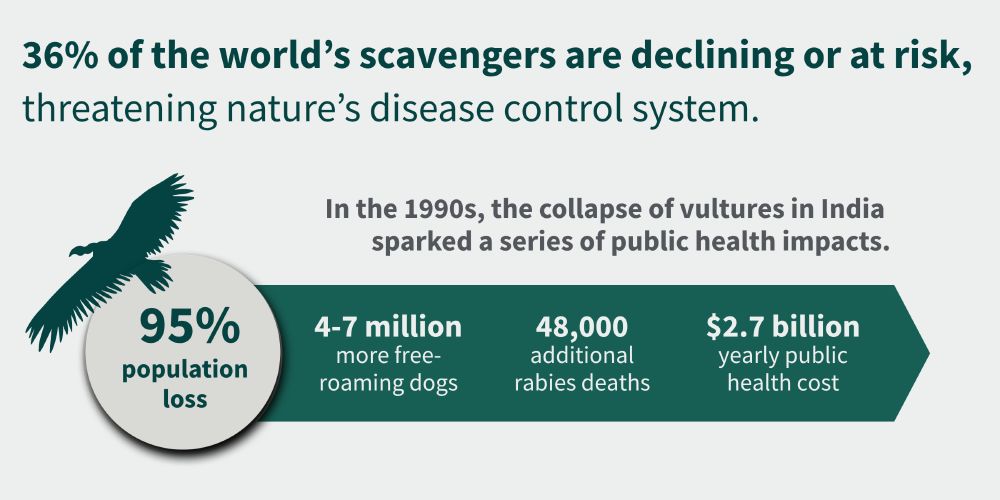
June 24, 2025 at 5:52 PM
Vultures might not be as beloved as bunnies, but they're key to human health. By eating carrion and culling the populations of smaller scavengers, they help limit the spread of zoonotic diseases.
A new Stanford study found that 36% of the world's scavenger species are in decline.
🔗 bit.ly/4kXmhfi
A new Stanford study found that 36% of the world's scavenger species are in decline.
🔗 bit.ly/4kXmhfi
Our 2025 #HumanAndPlanetaryHealth Early-Career Research awards are supercharging projects to investigate how:
🌆 Emissions from urban vegetation impact air quality
🐓 Living together with livestock drives antimicrobial resistance #AMR in rural, low-income communities
Learn more: bit.ly/44cb4Af
🌆 Emissions from urban vegetation impact air quality
🐓 Living together with livestock drives antimicrobial resistance #AMR in rural, low-income communities
Learn more: bit.ly/44cb4Af
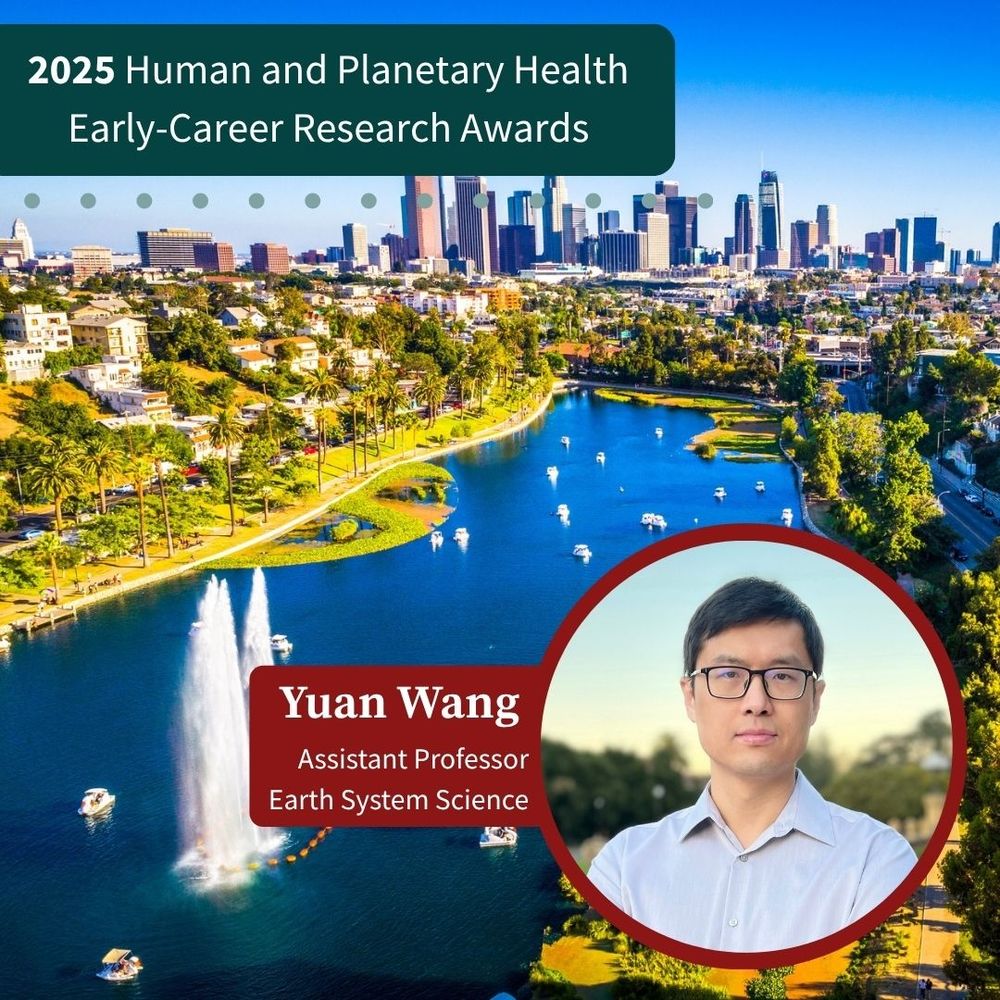
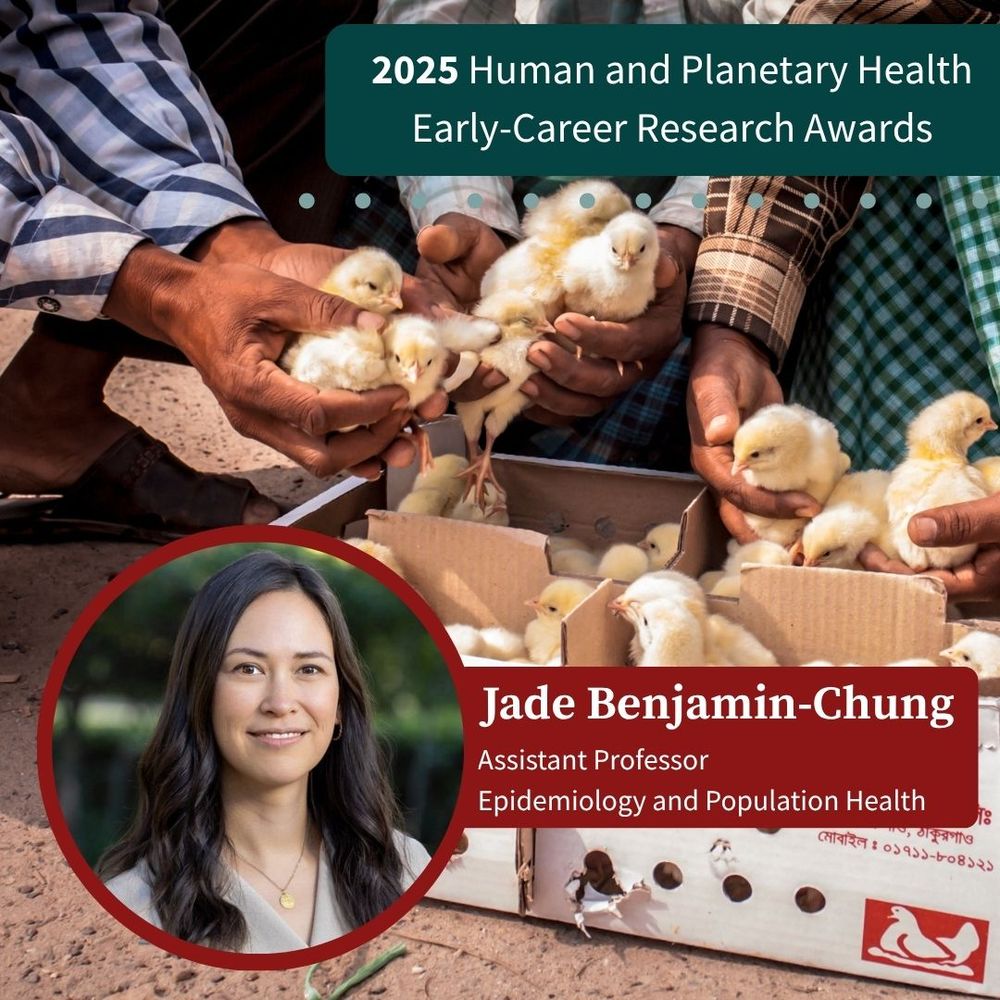
June 21, 2025 at 12:09 AM
Our 2025 #HumanAndPlanetaryHealth Early-Career Research awards are supercharging projects to investigate how:
🌆 Emissions from urban vegetation impact air quality
🐓 Living together with livestock drives antimicrobial resistance #AMR in rural, low-income communities
Learn more: bit.ly/44cb4Af
🌆 Emissions from urban vegetation impact air quality
🐓 Living together with livestock drives antimicrobial resistance #AMR in rural, low-income communities
Learn more: bit.ly/44cb4Af
Sometimes, solutions are simple. Stephen Luby, Nina Brooks @bostonu.bsky.social, and icddr,b researchers tested a low-cost, low-tech intervention to reduce #pollution from #BrickKilns in Bangladesh, a major threat to public health and the environment.
🎥: bit.ly/4kwdSPe
📝: stanford.io/3FGCK7Y
🎥: bit.ly/4kwdSPe
📝: stanford.io/3FGCK7Y
June 10, 2025 at 6:17 PM
Sometimes, solutions are simple. Stephen Luby, Nina Brooks @bostonu.bsky.social, and icddr,b researchers tested a low-cost, low-tech intervention to reduce #pollution from #BrickKilns in Bangladesh, a major threat to public health and the environment.
🎥: bit.ly/4kwdSPe
📝: stanford.io/3FGCK7Y
🎥: bit.ly/4kwdSPe
📝: stanford.io/3FGCK7Y
📣 Join us on June 12 for a discussion of wildfire risk mitigation!
Panelists will discuss new findings from the Climate and Energy Policy Program and future strategies for building a safer, more resilient grid.
Register: bit.ly/4dXA9U8
Panelists will discuss new findings from the Climate and Energy Policy Program and future strategies for building a safer, more resilient grid.
Register: bit.ly/4dXA9U8
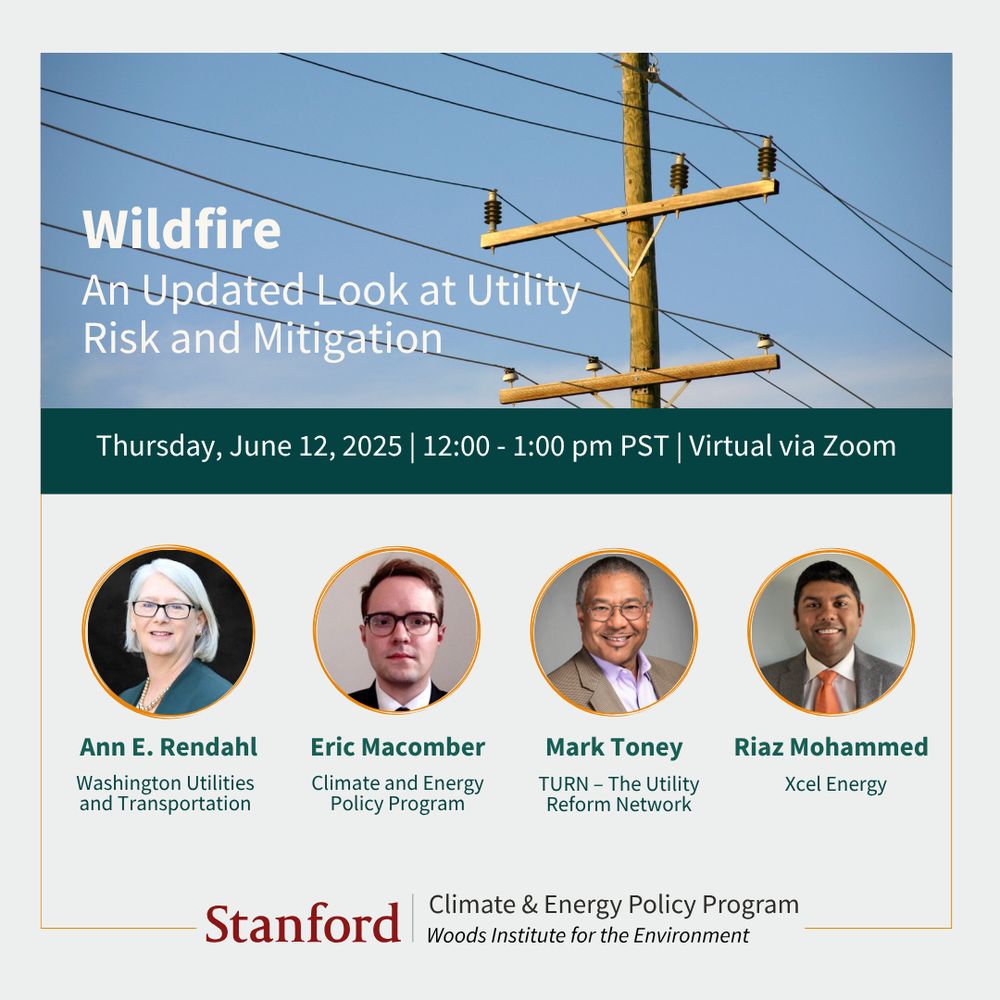
June 4, 2025 at 9:58 PM
📣 Join us on June 12 for a discussion of wildfire risk mitigation!
Panelists will discuss new findings from the Climate and Energy Policy Program and future strategies for building a safer, more resilient grid.
Register: bit.ly/4dXA9U8
Panelists will discuss new findings from the Climate and Energy Policy Program and future strategies for building a safer, more resilient grid.
Register: bit.ly/4dXA9U8
Join us May 19th as we host @katharinehayhoe.com, Chief Scientist at @nature.org for a conversation on human and planetary health and her career as an atmospheric scientist!
🔗 bit.ly/4jmUSCG
🔗 bit.ly/4jmUSCG

May 13, 2025 at 5:42 PM
Join us May 19th as we host @katharinehayhoe.com, Chief Scientist at @nature.org for a conversation on human and planetary health and her career as an atmospheric scientist!
🔗 bit.ly/4jmUSCG
🔗 bit.ly/4jmUSCG

